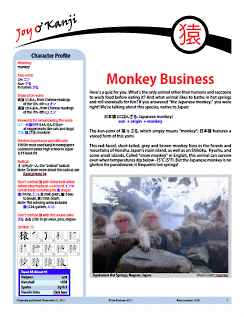猿
monkey
Kanji 1028
Thank you for visiting this Character Home Page. Below you'll find a synopsis of the essay. If you wish to read the full text, the PDF of the essay is available for FREE to the right.
In Japanese words and expressions, the monkey alternately comes off as badly behaved, wise, foolish, cunning, imitative, and uncontrolled in its passions. The interpretations of this creature’s mind shift as quickly as a monkey jumping from branch to branch. Find out the Japanese equivalents of "fighting like cats and dogs," "monkey mind," and "Curious George." Also learn about the world-famous monkeys who see no evil, hear no evil, and speak no evil.
Revision history:
Dec. 20, 2019: Generally revised and reformatted the essay to make it more consistent with how I do them now. These changes seem most significant:
- p. 2: Replaced the old Henshall etymology with the new one.
- p. 2: Added a sidebar that provides two non-Joyo kun-yomi for 猿.
- p. 3: Deleted a sidebar that added little.
- pp. 8–9: Added a "Where We've Been" section, which meant inserting a page between pages 8 and 9.
- p. 9: Added a link to the Kanshudo games.
Sept. 28, 2012:
- • Added 29 (!) photos. Of those, 21 are of monkeys at Monkey Park on the island of Shodoshima. Don't miss them!
- • Also reversed the order of the yomi in 三猿, putting さんざる before さんえん. People use さんざる more often.
Dec. 19, 2011:
- • This essay now has three more photos, all featuring 猿.
- • Sidebar 4 now states that 股 is in the Joyo set (rather than calling it non-Joyo).
- • There's more complete information on page 1 about the precise whereabouts of monkeys in Japan.
- • Image quality is a bit higher.



Comments